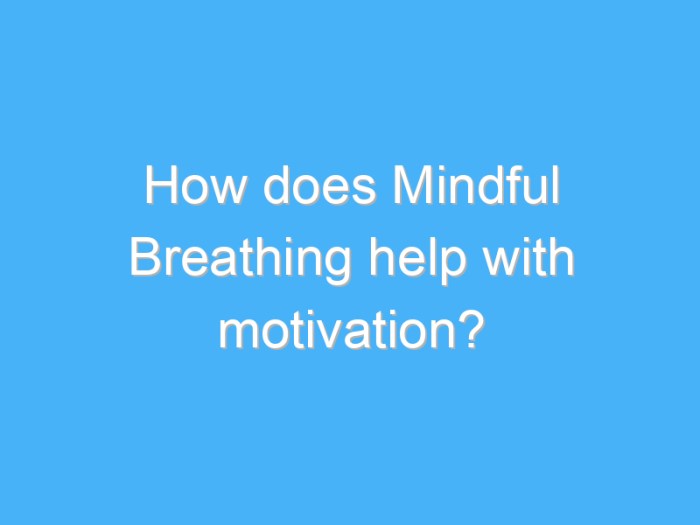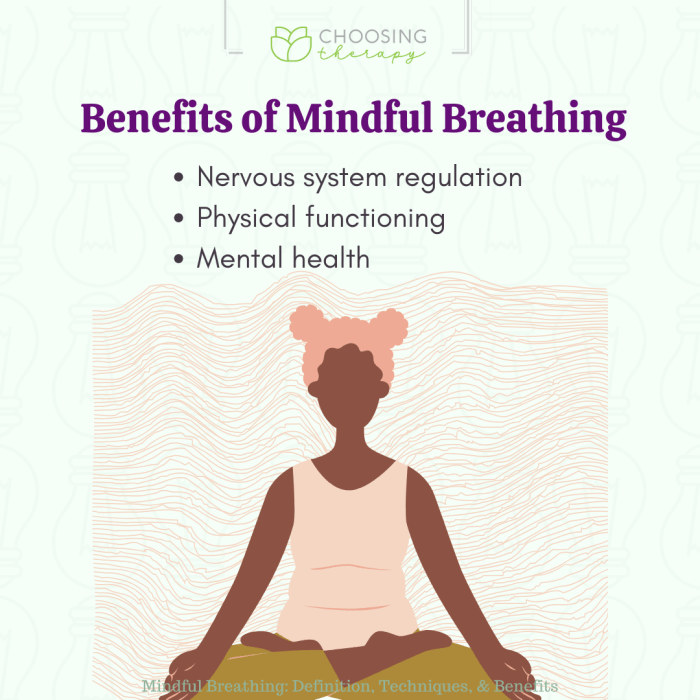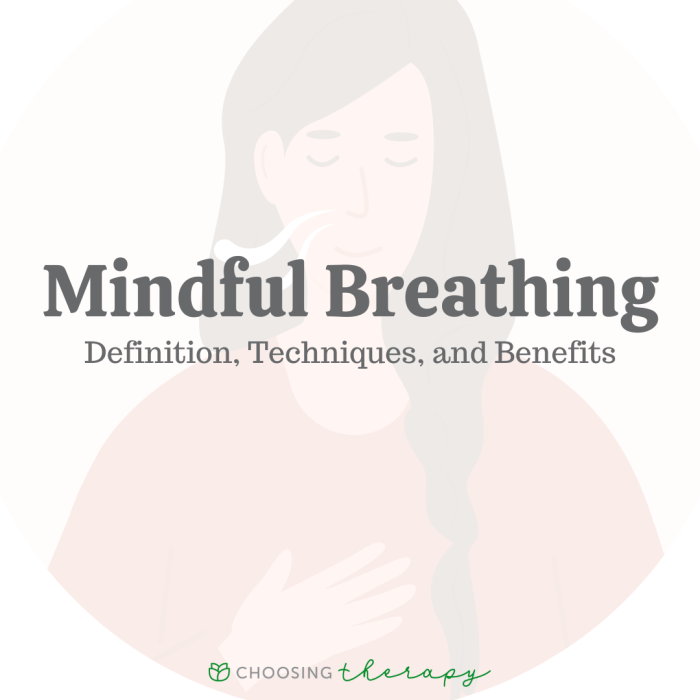15 Benefits of Practicing Mindful Breathing explores the transformative effects of this practice, offering a comprehensive look at how it can improve various aspects of life. From reducing stress to enhancing cognitive function, this article delves into the myriad advantages of incorporating mindful breathing into your daily routine.
Mindful breathing goes beyond just a simple technique; it becomes a way of life that nurtures the mind, body, and spirit. Let’s uncover the profound benefits awaiting those who embrace this practice wholeheartedly.
Introduction to Mindful Breathing
Mindful breathing is a form of meditation that involves focusing on your breath and being present in the moment. It is a technique that can help calm the mind, reduce stress, and improve overall well-being.
Originating from ancient Buddhist traditions, mindful breathing has been practiced for thousands of years as a way to cultivate mindfulness and awareness. By paying attention to the breath, one can develop a deeper connection to the present moment and increase self-awareness.
How Mindful Breathing Differs from Regular Breathing Techniques
- Mindful breathing involves deliberately focusing on the sensation of breathing, whereas regular breathing is often done automatically without much attention.
- With mindful breathing, the emphasis is on bringing awareness to each inhale and exhale, which can help regulate emotions and calm the mind.
- Regular breathing techniques may not incorporate the same level of mindfulness and intentionality as mindful breathing practices.
Physical Benefits of Mindful Breathing
Practicing mindful breathing can have a profound impact on the body, leading to various physical benefits that contribute to overall well-being.
Reduced Stress and Anxiety
- Mindful breathing helps calm the nervous system, reducing the production of stress hormones like cortisol.
- By focusing on the breath, individuals can shift their attention away from anxious thoughts, promoting a sense of relaxation and tranquility.
- Regular practice of mindful breathing has been linked to lower levels of anxiety and improved resilience to stress.
Improved Physical Health
- Deep breathing techniques can increase oxygen flow to the brain and body, improving overall circulation and promoting better cardiovascular health.
- Enhanced oxygenation through mindful breathing can boost energy levels and improve immune function.
- By reducing stress and anxiety, mindful breathing can also help alleviate physical symptoms associated with chronic conditions like high blood pressure, heart disease, and digestive disorders.
Mental Benefits of Mindful Breathing
Practicing mindful breathing not only brings physical benefits but also greatly impacts mental well-being. The act of focusing on your breath can help clear your mind and bring about a sense of mental clarity.
Improved Focus and Concentration
- Mindful breathing helps in directing your attention to the present moment, allowing you to let go of distractions and worries that may cloud your mind.
- By focusing on your breath, you train your mind to concentrate on one specific task, which can enhance your ability to focus on other activities as well.
- Regular practice of mindful breathing can sharpen your concentration skills, leading to improved productivity and efficiency in various aspects of your life.
Promoting Emotional Well-being
- Through mindful breathing, you can cultivate a greater awareness of your emotions and learn to respond to them in a more balanced and calm manner.
- By taking deep breaths and staying present in the moment, you can regulate your emotions and prevent impulsive reactions to challenging situations.
- Mindful breathing can help reduce stress and anxiety levels, promoting emotional stability and overall well-being.
Spiritual Benefits of Mindful Breathing
When it comes to the spiritual benefits of mindful breathing, it is important to understand how this practice connects individuals to their spiritual selves. Mindful breathing is not just about focusing on the breath; it is also about being present in the moment and connecting with one’s inner self on a deeper level. This connection to the spiritual self can lead to a greater sense of peace, clarity, and overall well-being.
Relationship Between Mindful Breathing and Mindfulness Practices, 15 Benefits of Practicing Mindful Breathing
- Mindful breathing is a key component of mindfulness practices, which involve being fully present and aware of the current moment without judgment.
- By incorporating mindful breathing into mindfulness practices, individuals can cultivate a more profound sense of self-awareness and spiritual connection.
- Practicing mindful breathing can help individuals quiet the mind, reduce distractions, and tap into their spiritual essence.
Impact of Mindful Breathing on Spiritual Growth and Self-Awareness
- Regular practice of mindful breathing can lead to spiritual growth by fostering a deeper connection to one’s inner self and the world around them.
- Through mindful breathing, individuals can develop a greater sense of self-awareness, allowing them to better understand their thoughts, emotions, and behaviors.
- By engaging in mindful breathing, individuals can enhance their spiritual journey, leading to a more profound sense of purpose and fulfillment in life.
Mindful Breathing Techniques
Practicing mindful breathing techniques can help you cultivate a sense of calm and focus in your daily life. Here are some step-by-step instructions for beginners on how to start incorporating mindful breathing into your routine, along with different breathing exercises to try and tips for maintaining a consistent practice.
Diaphragmatic Breathing
Diaphragmatic breathing, also known as belly breathing, is a simple yet effective technique to practice mindful breathing. Follow these steps:
- Find a comfortable seated position with your back straight.
- Place one hand on your chest and the other on your belly.
- Inhale deeply through your nose, feeling your belly rise as you fill your lungs with air.
- Exhale slowly through your mouth, feeling your belly fall as you release the air.
- Repeat this process for a few minutes, focusing on the sensation of your breath moving in and out of your body.
Box Breathing
Box breathing is a technique that involves equalizing the length of your inhales, exhales, and pauses in between. Here’s how to practice it:
- Inhale deeply for a count of four seconds.
- Hold your breath for a count of four seconds.
- Exhale slowly for a count of four seconds.
- Pause for a count of four seconds before inhaling again.
- Repeat this cycle for several minutes, focusing on the rhythm of your breath.
Tips for Maintaining a Consistent Practice
To ensure you stay committed to your mindful breathing practice, consider the following tips:
- Schedule regular practice sessions at the same time each day to establish a routine.
- Start with shorter sessions and gradually increase the duration as you become more comfortable.
- Find a quiet and comfortable space where you won’t be disturbed during your practice.
- Experiment with different techniques to discover what works best for you.
- Use reminders or cues throughout the day to bring your attention back to your breath and stay present in the moment.
Mindful Breathing for Stress Relief

Mindful breathing is a powerful tool that can help manage stress and promote relaxation. By focusing on your breath, you can calm your mind and body, reducing the impact of stressful situations.
Physiological Changes during Mindful Breathing
- During mindful breathing, the body activates the parasympathetic nervous system, which helps counteract the stress response.
- Deep breathing increases oxygen flow to the brain, promoting a sense of calm and clarity.
- Regular practice of mindful breathing can lower heart rate, blood pressure, and cortisol levels, all of which are elevated during times of stress.
Real-life Examples of Mindful Breathing Benefits
- John, a busy executive, practices mindful breathing before important meetings to stay focused and calm under pressure.
- Sarah, a student, uses mindful breathing techniques to manage test anxiety and improve her concentration during exams.
- Amy, a new parent, incorporates mindful breathing into her daily routine to reduce stress and increase patience when dealing with her baby’s needs.
Mindful Breathing in Daily Life
Integrating mindful breathing into our daily routines can have a profound impact on our overall well-being. By incorporating this practice into various activities, we can experience enhanced focus, relaxation, and connection to the present moment.
Enhancing Work Performance
Practicing mindful breathing at work can help improve concentration, reduce stress, and enhance productivity. Taking short breaks to focus on your breath can clear your mind and increase mental clarity, leading to better decision-making and creativity.
Optimizing Exercise and Physical Activity
Utilizing mindful breathing techniques during exercise can improve endurance, performance, and post-workout recovery. By syncing your breath with your movements, you can enhance body awareness, prevent injury, and maintain a steady rhythm throughout your workout.
Nurturing Relationships
Applying mindful breathing in interactions with others can foster better communication, empathy, and connection. By staying present and attentive to your breath during conversations, you can cultivate a sense of calmness, patience, and understanding, leading to more meaningful and harmonious relationships.
Long-Term Effects
Consistently incorporating mindful breathing into everyday life can have lasting benefits on our physical, mental, and emotional well-being. Over time, this practice can help reduce overall stress levels, improve sleep quality, boost resilience, and promote a sense of inner peace and contentment.
Mindful Breathing for Sleep Improvement
Improving sleep quality is crucial for overall health and well-being. Mindful breathing techniques can play a significant role in helping you achieve a restful night’s sleep.
Bedtime Routine with Mindful Breathing
Establishing a bedtime routine that includes mindful breathing can signal to your body that it is time to wind down and prepare for sleep. This can help calm the mind and reduce stress, making it easier to fall asleep.
- Start by finding a comfortable position in bed, either lying down or sitting up with your back straight.
- Close your eyes and begin to focus on your breath. Take slow, deep breaths in through your nose and out through your mouth.
- Concentrate on the sensation of your breath entering and leaving your body, letting go of any racing thoughts or worries.
- Continue this mindful breathing practice for several minutes, allowing yourself to relax and unwind before drifting off to sleep.
Importance of Relaxation through Mindful Breathing
Relaxation is key to promoting a restful night’s sleep. Mindful breathing can help quiet the mind, reduce anxiety, and ease tension in the body, creating the ideal conditions for falling asleep and staying asleep throughout the night.
By incorporating mindful breathing into your bedtime routine, you can cultivate a sense of calm and inner peace, paving the way for improved sleep quality and overall well-being.
Mindful Breathing and Cognitive Function: 15 Benefits Of Practicing Mindful Breathing
When it comes to cognitive function, mindful breathing can play a crucial role in enhancing various mental processes. By focusing on the breath and being present in the moment, individuals can experience improvements in their cognitive abilities.
Enhanced Focus and Attention
- One of the key benefits of mindful breathing is the improvement in focus and attention. Studies have shown that regular practice of mindful breathing can help individuals concentrate better on tasks at hand.
- By training the mind to stay present and avoid distractions, mindful breathing can enhance cognitive performance in activities that require sustained attention.
Memory and Learning
- Mindful breathing has been linked to improvements in memory and learning capabilities. Research suggests that the practice can help individuals retain information better and enhance their ability to learn new things.
- By reducing stress and anxiety levels, mindful breathing creates a conducive environment for memory formation and cognitive processing.
Decision-Making Skills
- Engaging in mindful breathing can also positively impact decision-making skills. By promoting a calm and clear state of mind, individuals are better equipped to make sound judgments and choices.
- Studies have indicated that incorporating mindful breathing into daily routines can lead to more rational and effective decision-making processes.
Mindful Breathing for Emotional Regulation

When it comes to emotional regulation, mindful breathing can be a powerful tool to help manage and control our feelings. By focusing on our breath, we can create a sense of calmness and awareness that allows us to respond to emotions in a more mindful way.
Using Mindful Breathing to Manage Anger
- When feeling angry, take deep breaths and focus on the sensation of the breath entering and leaving your body.
- By practicing mindful breathing, you can create space between the initial emotion of anger and your reaction, allowing you to respond more thoughtfully.
- Regular mindful breathing can help decrease the intensity of anger and promote a sense of inner peace and control.
Using Mindful Breathing to Manage Sadness
- During moments of sadness, mindful breathing can help you acknowledge and accept your emotions without judgment.
- By breathing mindfully, you can connect with the present moment and cultivate a sense of compassion towards yourself.
- Engaging in mindful breathing practices can provide comfort and solace during times of sadness, allowing you to process your feelings in a healthy way.
Using Mindful Breathing to Manage Frustration
- When feeling frustrated, take a few moments to focus on your breath and observe the sensations in your body.
- Mindful breathing can help you release tension and frustration by bringing your attention back to the present moment.
- By incorporating mindful breathing into your daily routine, you can develop a greater sense of patience and resilience in dealing with frustrating situations.
Mindful Breathing and Body Awareness
Mindful breathing plays a crucial role in enhancing body awareness by helping individuals connect deeply with their physical sensations and internal state. This practice allows for a greater understanding of how the breath moves through the body and how different parts of the body respond to each inhale and exhale.
Techniques to Deepen the Connection Between Breath, Body, and Mind
- Body Scan Meditation: Start by focusing on your breath and then slowly shift your attention to different parts of your body, noticing any tension or sensations present.
- Sensory Awareness: Pay attention to how the breath feels as it enters and exits the body, noticing the temperature, texture, and movement associated with each breath.
- Movement with Breath: Engage in gentle movements or yoga poses while focusing on syncing your breath with each movement, creating a harmonious connection between body and breath.
- Grounding Techniques: Use mindful breathing to anchor yourself in the present moment, feeling the support of the ground beneath you and the expansion of your lungs with each breath.
Mindful Breathing for Self-Reflection
Mindful breathing can be a powerful tool for self-reflection and introspection. By focusing on your breath, you create a space for deep introspective practices that can lead to personal growth and development. Through mindful breathing, you can cultivate a greater awareness of your thoughts, emotions, and behaviors, allowing you to gain valuable insights into yourself.
Combining Mindful Breathing with Self-Inquiry
- Start by finding a quiet and comfortable space where you can sit or lie down.
- Close your eyes and focus on your breath, observing the inhalation and exhalation without judgment.
- As you continue to breathe mindfully, begin to ask yourself reflective questions such as “What am I feeling right now?” or “What thoughts are arising in my mind?”
- Notice any physical sensations or emotions that arise during this process, allowing yourself to fully experience and acknowledge them.
- Use the insights gained from this practice to reflect on your patterns of behavior, beliefs, and reactions, fostering a deeper understanding of yourself.
Mindful Breathing for Relationship Building

When it comes to fostering strong and healthy relationships, mindful breathing can play a crucial role in improving communication, empathy, and overall connection between individuals. By incorporating mindful breathing practices into your daily interactions, you can enhance your ability to listen, understand, and respond to others with compassion and kindness.
Improving Communication and Empathy
- Mindful breathing helps individuals become more present and focused during conversations, allowing them to truly listen to what the other person is saying without distractions.
- By practicing mindful breathing, individuals can cultivate a sense of calmness and patience, which can prevent misunderstandings and conflicts in relationships.
- Increased self-awareness through mindful breathing can also enable individuals to recognize their own emotional triggers and respond to others in a more thoughtful and understanding manner.
Fostering Compassion and Understanding
- Through mindful breathing, individuals can develop a greater sense of empathy towards their partners, family members, or friends, as they become more attuned to their thoughts and emotions.
- By being fully present and mindful during interactions, individuals can show genuine care and concern for the well-being of others, fostering a deeper sense of connection and trust in relationships.
- Practicing mindful breathing together can create a shared experience that strengthens the bond between couples or family members, promoting mutual respect and understanding.
Practices for Couples or Families
- Set aside dedicated time each day to practice mindful breathing together, whether it’s in the morning, before bed, or during moments of stress or tension.
- Engage in guided breathing exercises or meditation sessions as a couple or family to create a harmonious and peaceful environment for open communication and connection.
- Encourage each other to express gratitude and appreciation for one another during mindful breathing sessions, fostering a positive and loving atmosphere in relationships.
Mindful Breathing and Productivity

Practicing mindful breathing can have a significant impact on boosting productivity and efficiency in various aspects of life, including work and study routines. By incorporating mindful breathing techniques into your daily activities, you can enhance focus, creativity, and problem-solving skills, ultimately leading to improved overall productivity.
Impact of Mindful Breathing on Focus, Creativity, and Problem-Solving
- Mindful breathing helps in increasing focus by calming the mind and reducing distractions, allowing individuals to concentrate better on tasks at hand.
- By promoting relaxation and reducing stress, mindful breathing can enhance creativity as it creates a conducive environment for new ideas to emerge.
- Engaging in mindful breathing practices can improve problem-solving skills by helping individuals approach challenges with a clear and composed mind, leading to more effective solutions.
Strategies for Incorporating Mindful Breathing into Work or Study Routines
- Take short mindful breathing breaks throughout the day to reset your focus and recharge your energy levels.
- Integrate mindful breathing exercises into your daily schedule, such as before starting a task or during transitions between activities.
- Use mindful breathing techniques during challenging or stressful situations to maintain composure and approach problems with a clear mind.
Mindful Breathing for Overall Well-being

Practicing mindful breathing can have a profound impact on our overall well-being by addressing the interconnectedness of physical, mental, and emotional health. By focusing on our breath, we can harness its power to bring balance and harmony to our mind, body, and spirit.
Harmonizing Physical, Mental, and Emotional Well-being
- Mindful breathing helps regulate our body’s physiological functions, such as lowering blood pressure, reducing heart rate, and improving digestion.
- By calming the mind through mindful breathing, we can alleviate stress, anxiety, and depression, promoting mental clarity and emotional stability.
- Connecting with our breath allows us to cultivate self-awareness, emotional intelligence, and resilience in facing life’s challenges with a sense of calm and equanimity.
Final Review
In conclusion, the 15 Benefits of Practicing Mindful Breathing illuminate the path to a more balanced and harmonious existence. By integrating this practice into your daily life, you can experience a profound sense of well-being that radiates through every aspect of your being. Start your mindful breathing journey today and unlock the transformative power it holds.